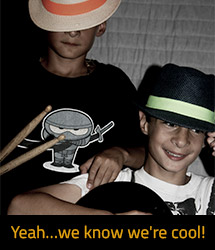Music fills a void in many ways for so many people; it should come as no surprise that it can perform wonders when applied to teaching children. The higher level the art engagement a student has, the greater the chance that student has of achieving academically. With music instruction by certified music teachers, student score higher on tests, increase overall G.P.A’s, develop improved skills in creative problem solving, advance their critical thinking abilities, and have an increased chance of graduating high school.
Each of us learns differently and music has the ability to reach everyone regardless of how one is wired to receive information. For students who have even greater challenges in school, the impact of music along with the arts generally has been tremendous. The very act of playing an instrument creates a multisensory experience for children who need real tactile exposure in order to receive information more clearly. It also helps with developing fine motor skills that are needed in the classroom, but not all children develop at the same time. There are numerous studies on how music supports cognition as well.
See:
Cognitive and behavioural effects of music-based exercises in patients with dementia
There are countless programs designed for the arts to be integrated into an academic program and they can be added with little or no cost to schools. Many can be found at the Education Closet.
Music performance improves a child’s self- image whereby improving a child’s well-being. The result is they are more likely to achieve social and academic development supporting real emotional connections among their peers. Given all this, it is clear that music is a powerful tool that schools should embrace by immersing their students in it.

